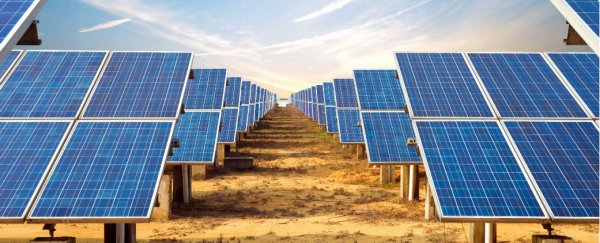Australia can make deep cuts to its carbon emissions and become entirely powered by renewable energy by mid-century, all for a relatively low cost, a new study has found.
The report, which was released this week, was prepared by researchers at the Australian National University in Canberra on behalf of WWF-Australia.
It argues that the country's renewable energy potential is 500 times greater than the current installed capacity, and notes that forecasting by the Government's Treasury Department regarding the cost of large-scale renewable energy plants is outdated.
"The costs of some carbon-free technologies, including solar and wind power, have fallen much faster than expected," the report states. "For example, large-scale solar panel power stations are already only half the cost that the Treasury's 2008 and 2011 modelling studies estimated they would be in the year 2030."
The report also highlights that Australia's economy can continue to grow while achieving ambitious targets to reduce greenhouse gas emission over the short and long-term, and says the country could achieve net-zero emissions by offsetting limited fossil fuel use in remote areas with farming and forestry initiatives.
It's no secret that Australia has a wealth of potential renewable energy at its disposal. The problem is, the country's also abundantly rich in coal. It's one of the world's largest coal exporters, and at home, coal is used to produce around 65 percent of electricity.
What's worrying is that Australia emits more carbon dioxide per capita than any other developed western nation, and the electricity sector accounts for about one-third of those emissions.
And despite reports like this, which demonstrate the feasibility of renewable energy and the urgent need to reduce emissions, the Federal Government seems unprepared to take meaningful action.
In October 2014, the country's Prime Minister, Tony Abbott, said, "coal is good for humanity" and is "an essential part of our economic future, here in Australia, and right around the world."
And more recently, the Government's much-anticipated Intergenerational Report has been slammed by critics for failing to acknowledge the potentially catastrophic impacts of climate change.
As Greg Jericho wrote for The Guardian, the report "dismisses climate change as no big thing" and "absurdly it contains no budgetary or economic impacts of climate change beyond 2020, and the document is at pains to make it clear one nation cannot change the climate."
And other big emitters such as China, the US, and Brazil, have started to call Australia to task for its lack of effort on climate change mitigation, The Sydney Morning Herald reports.
While it's great to float the idea of a 100 percent renewable Australia, the major hurdle is leveraging this knowledge to guide transformative policies. A starting point could be to provide a regulatory framework that encourages rather than thwarts investment in large-scale renewable energy. It would also be good if the country's post-2020 emissions reduction targets matched those of other developed countries.
In another report released this week, the Climate Change Authority, an independent Australian body, recommended that the government adopt an ambitious 30 percent reduction target on 2000 levels by 2025, and says it should aim for 40 to 60 percent reductions by 2030.
"If Australia were to pledge the recommended 30 per cent target at the Paris conference [later this year] this would likely be considered the behaviour of a good global citizen, and go some way to answering those who have questioned Australia's commitment to climate change policy in recent times," Climate Change Authority chair, Bernie Fraser, told The Sydney Morning Herald.
Sources: The Sydney Morning Herald, The Guardian
